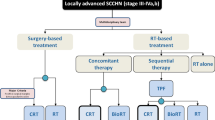Abstract
Introduction
Radiation therapy is considered the standard treatment for early glottic cancers; and recent trials have evaluated the role of hypofractionation with mixed results. We conducted this systematic review and meta-analysis to assess the impact of hypofractionation in early glottic cancers.
Methods
We performed a comprehensive search of the PubMed, Embase and Google scholar to look for studies which have evaluated the role of hypofractionation in early glottic cancers. Only prospective trials were included in the present analysis. RevMan software (Cochrane Collaboration’s Information Management System) was used for the meta-analysis.
Results
The analysis included a total of five studies and 1153 patients. Hypofractionation was found to significantly improve local control rates with an Odds ratio of 0.55 [95% CI 0.13–0.85]. The voice preservation rates with hypofractionation ranged from 86 to 94%. No significant improvement in overall survival was noted with the used of hypofractionation [hazard ratio 1.09, 95% CI 0.69–1.71]. There was an increased incidence of grade 2 or higher acute mucositis toxicity with use of hypofractionation [Odds ratio 1.54, 95% CI 1.12–2.11]. The incidence of acute skin toxicity was not increased with use of hypofractionation. Late toxicity was very low and not increased with use of hypofractionation.
Conclusion
Moderate hypofractionation as compared to conventional fractionation, in laryngeal cancer, is associated with significantly improved local control without impact on overall survival. The use of hypofractionation is associated with an increased incidence of acute mucositis though incidence of long-term toxicity was not significantly increased. Hence, moderate-dose hypo-fractionation should be considered as the new standard of care in early laryngeal cancer.





Similar content being viewed by others
References
Warner L, Chudasama J, Kelly CG, Loughran S, McKenzie K, Wight R, Dey P (2014) Radiotherapy versus open surgery versus endolaryngeal surgery (with or without laser) for early laryngeal squamous cell cancer. Cochrane Database Syst Rev.https://doi.org/10.1002/14651858.CD002027
Moon SH, Cho KH, Chung EJ, Lee CG, Lee KC, Chai GY, Kang KM, Lee JY, Chung WK, Park WY, Kim JH (2014) A prospective randomized trial comparing hypofractionation with conventional fractionation radiotherapy for T1–2 glottic squamous cell carcinomas: results of a Korean Radiation Oncology Group (KROG-0201) study. Radiother Oncol 110(1):98–103
Yamazaki H, Nishiyama K, Tanaka E, Koizumi M, Chatani M (2006) Radiotherapy for early glottic carcinoma (T1N0M0): results of prospective randomized study of radiation fraction size and overall treatment time. Int J Radiat Oncol Biol Phys 64(1):77–82
Kodaira T, Kagami Y, Shibata T, Shikama N, Nishimura Y, Ishikura S, Nakamura K, Saito Y, Matsumoto Y, Teshima T, Ito Y, Akimoto T, Nakata K, Toshiyasu T, Nakagawa K, Nagata Y, Nishimura T, Uno T, Kataoka M, Yorozu A, Hiraoka M (2018) Radiation Therapy Study Group of the Japan Clinical Oncology Group. Results of a multi-institutional, randomized, non-inferiority, phase III trial of accelerated fractionation versus standard fractionation in radiation therapy for T1-2N0M0 glottic cancer: Japan Clinical Oncology Group Study. Ann Oncol 29(4):992–997
Alam MS, Perween R, Siddiqui SA (2016) Accelerated versus conventional radiation fractionation in early stage carcinoma larynx. Indian J Cancer 53(3):402–407
Szutkowski Z, Kawecki A, Jarząbski A, Laskus Z, Krajewski R, Michalski W, Kukołowicz P (2016) Hypofractionated accelerated radiotherapy in T1–3 N0 cancer of the larynx: a prospective cohort study with historical controls. Rep Pract Oncol Radiother 21(6):537–543
Bledsoe TJ, Park HS, Stahl JM, Yarbrough WG, Burtness BA, Decker RH, Husain ZA (2017) Hypofractionated radiotherapy for patients with early-stage glottic cancer patterns of care and survival. J Natl Cancer Inst 109(10):djx042
Funding
No financial support received.
Author information
Authors and Affiliations
Corresponding author
Ethics declarations
Conflicts of interest
The authors have no conflict of interest.
Research involving human participants and/or animals
Not applicable.
Informed consent
Not applicable.
Additional information
Publisher's Note
Springer Nature remains neutral with regard to jurisdictional claims in published maps and institutional affiliations.
Rights and permissions
About this article
Cite this article
Benson, R., Prashanth, G. & Mallick, S. Moderate hypofractionation for early laryngeal cancer improves local control: a systematic review and meta-analysis. Eur Arch Otorhinolaryngol 277, 3149–3154 (2020). https://doi.org/10.1007/s00405-020-06012-9
Received:
Accepted:
Published:
Issue Date:
DOI: https://doi.org/10.1007/s00405-020-06012-9




